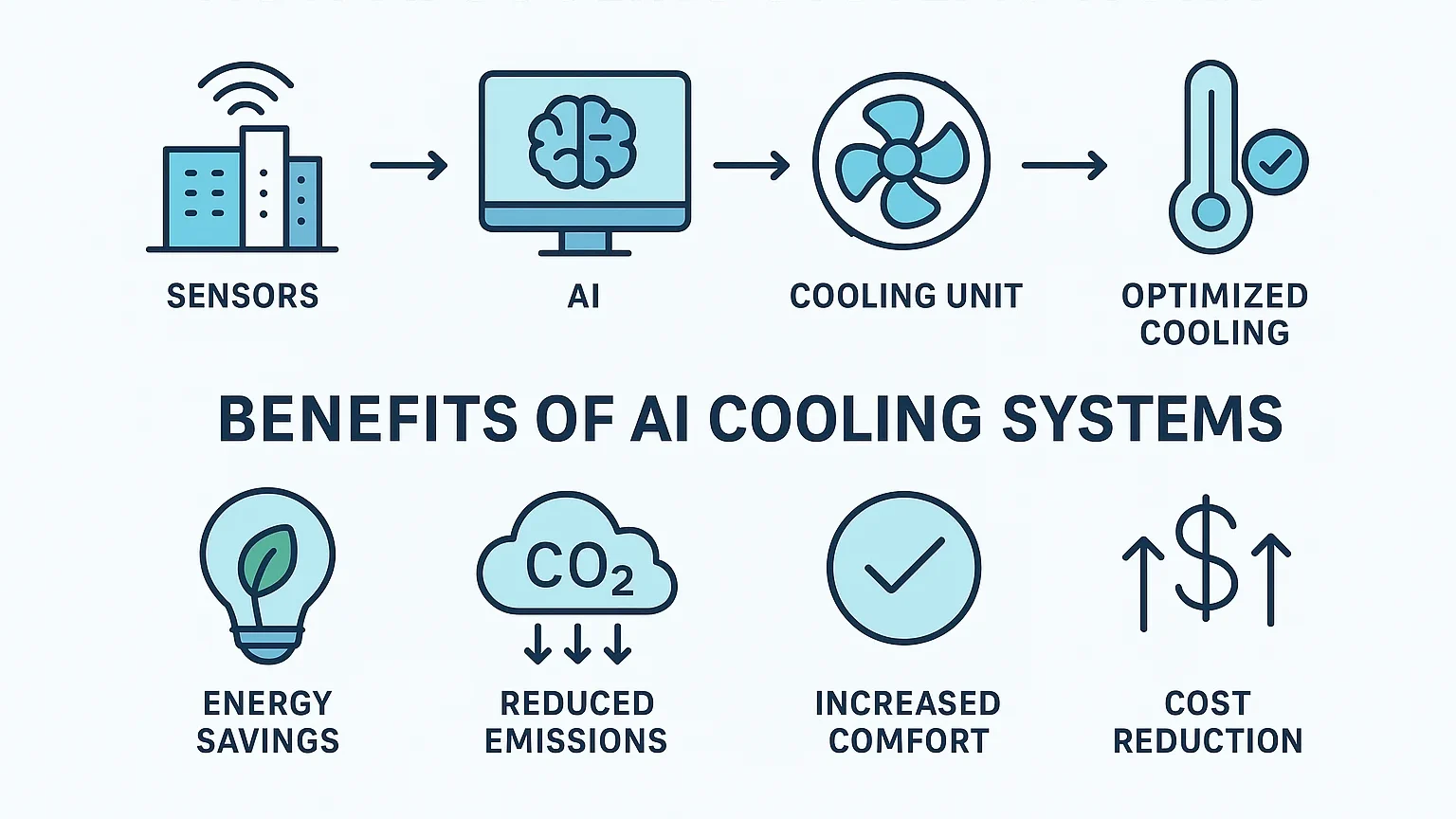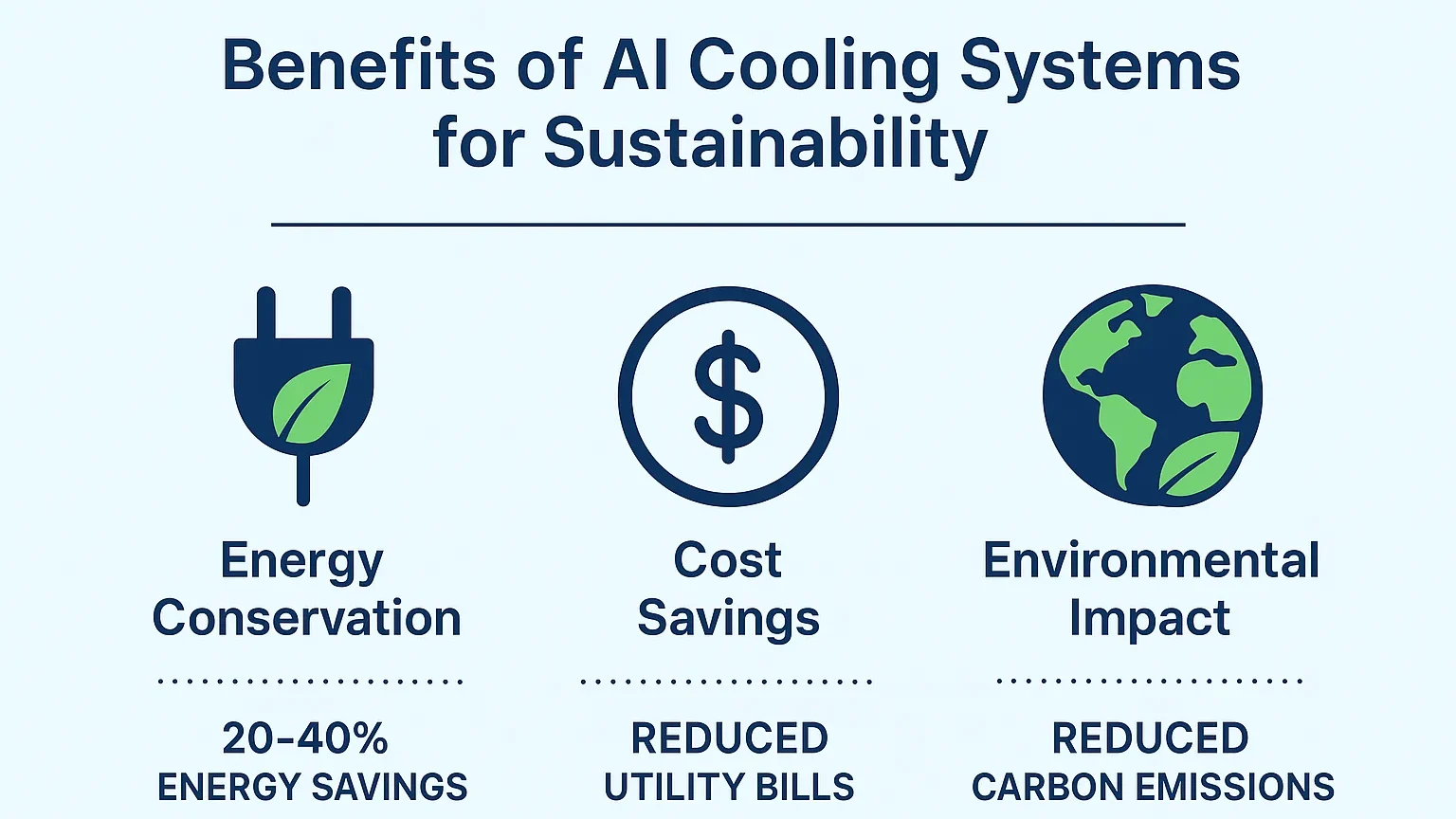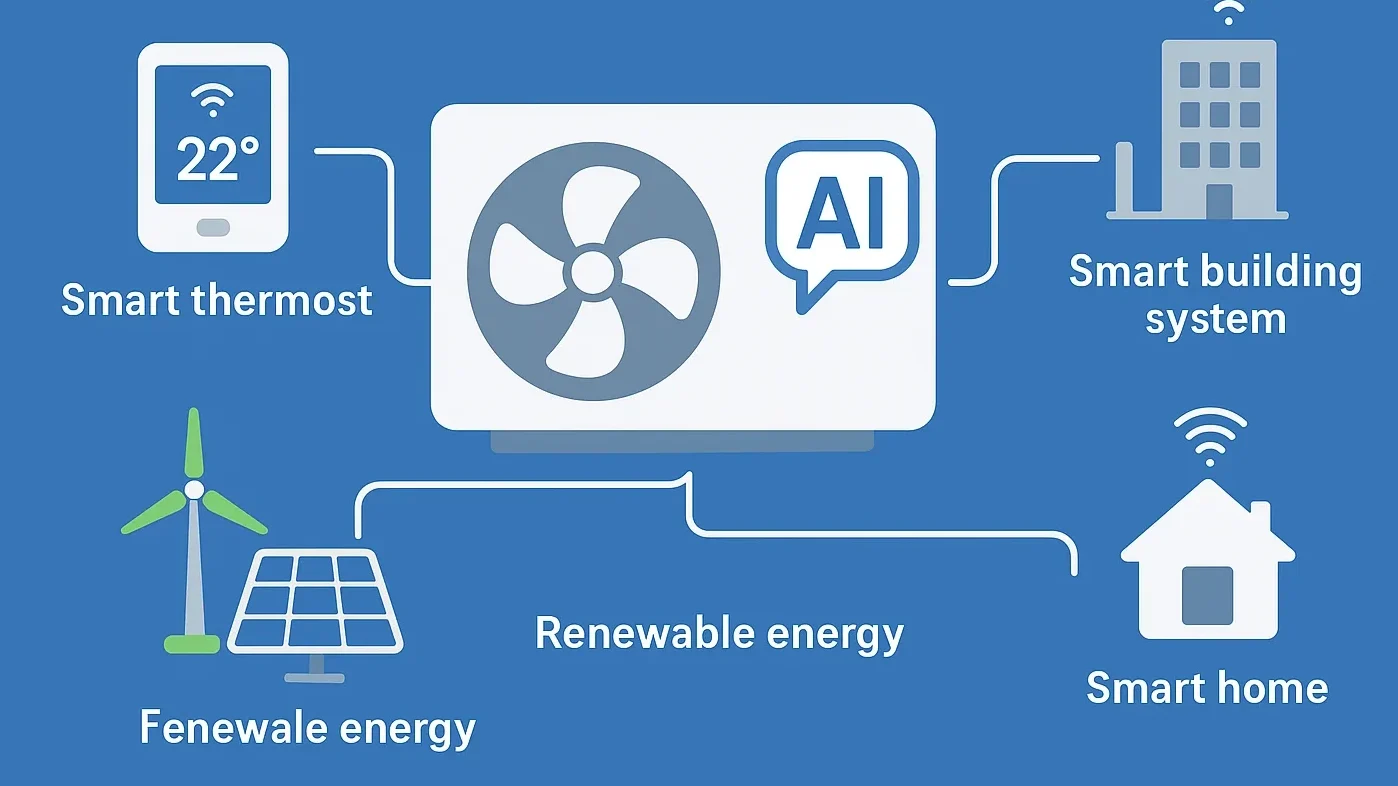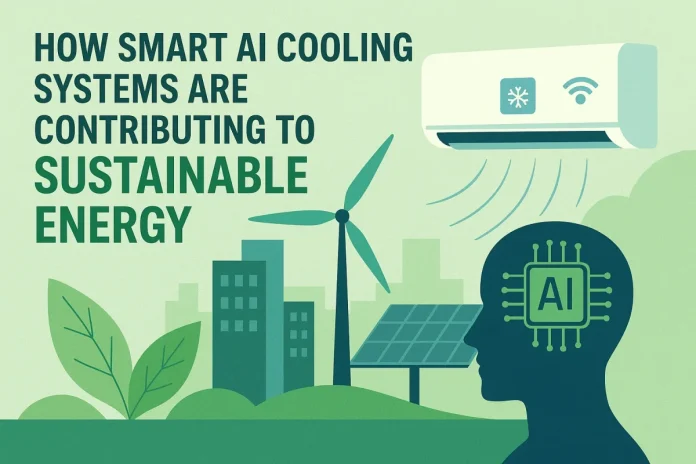During a time of rising environmental concerns and growing attention to energy conservation, emerging technologies are reshaping our lives and are fundamental to a sustainable future. One of these that stands out is the innovative AI cooling systems, which have redefined how we monitor and conserve energy in homes, workplaces, and factories. New fanless, direct liquid cooling designs for AI and data center hardware can reduce cooling power consumption by up to 90% compared to traditional air-cooled systems. Utilizing AI (Artificial Intelligence) in cooling solutions aims to make the most effective use of energy while minimizing cost and environmental impact. This article examines the science behind AI-based cooling systems, the advantages they offer for sustainability, and how they integrate with other technological developments to make the world a greener place.
Table of contents
The Evolution of Cooling Systems
Cooling systems for ventilation and air conditioning, including HVAC units, have existed for a long time to help maintain comfortable indoor living environments. However, typical systems aren’t as tidy, often wasting a lot of energy through fixed schedules and manual tuning. For instance, a typical air conditioner may be pumping to its full capacity when a room is empty, or during times of the day when it’s cooler, driving up energy costs and carbon emissions without making people feel any more comfortable.
First, we see the emergence of new AI cooling technology. Leveraging advanced algorithms, machine learning, and real-time data to allow each of these systems to determine the best cooling output. By considering occupation, external conditions, humidity, and the user profile, AI-led systems dynamically adjust their activities to operate at their optimal level while consuming less energy. This shift from the old ‘let’s react to the temperature as it is’ to a new mindset of ‘let’s make plans for how the energy is used’ is going to change the energy efficiency game.
How AI Enhances Cooling Efficiency

At the heart of innovative AI cooling systems is their ability to process and respond to complex data in real time. Unlike traditional systems, which operate on preset parameters, AI systems continuously learn and adapt to their environment. Here’s how they achieve this:
- Occupancy Detection: Using sensors and IoT (Internet of Things) integration, AI cooling systems can detect whether a space is occupied. If a room is empty, the system can reduce cooling output or switch to an energy-saving mode, preventing unnecessary energy consumption.
- Weather Forecasting: AI systems can access real-time weather data and forecasts to predict temperature changes throughout the day. For instance, if a cooler evening is expected, the system might reduce cooling intensity in the afternoon to conserve energy while maintaining comfort.
- User Behavior Analysis: Over time, AI systems learn user preferences, including preferred temperature settings and cooling schedules. This allows the system to tailor its operations to individual needs, further optimizing energy use.
- Predictive Maintenance: AI can monitor the health of cooling systems, identifying potential issues before they lead to breakdowns or inefficiencies. Regular maintenance, such as that provided by Professional air conditioning maintenance Sutherland, complements this feature by ensuring systems remain in top condition, reducing energy waste caused by faulty components.
By combining these capabilities, AI cooling systems achieve significant energy savings, often reducing consumption by 20-40% compared to traditional systems. This not only lowers utility bills but also contributes to a substantial reduction in greenhouse gas emissions.
The Environmental Impact of AI Cooling Systems

The ecological advantages of AI cooling rigs are staggering. Heating and cooling are responsible for close to half of all the power used in residential and commercial buildings, according to the U.S. Energy Information Administration. AI systems tackle this major driver of global energy consumption by optimizing cooling.
Intelligent AI cooling systems in an office building that adjust cooling as per occupancy patterns to save power are one such example. During off hours or weekends, when people aren’t around, the system can dial back without sacrificing comfort, saving energy. At a broader level, the widespread adoption of these systems can contribute to a substantial reduction in global energy demand, potentially helping to mitigate climate change.
Not to mention, AI cooling systems are also ‘eco-friendly’, helping ease the strain on power grids. Traditional cooling systems can strain electrical grids during peak demand, such as hot summer days, leading to outages or the increased use of fossil-fuel-based power plants. AI systems, however, can distribute cooling loads during less busy periods of the day or be linked with sustainable sources, such as solar panels – all while reducing environmental impact.
Cost Savings for Businesses and Households
AI cooling systems not only provide environmental benefits but will also result in significant cost savings. Initial investment in new technology may be higher than traditional methods, but the long-term savings are substantial. Using less energy means spending less money on power, which directly impacts our utility bills. Additionally, predictive maintenance offered through AI systems can help stave off high-priced repairs.
Businesses have very good financial reasons to do so. Many extensive commercial facilities, such as office buildings or retail spaces, have substantial cooling needs. AI-powered HVAC systems can help businesses minimize operational costs while demonstrating a commitment to sustainability, a key factor in consumer and investor decision-making.
Households also stand to benefit. Smart thermostats, often an integral part of AI-powered cooling systems, enable homeowners to control their cooling from phone apps remotely. This type of management essentially powers the amount of energy that will be applied when the occupants aren’t in your house. In combination with regular maintenance services, such as Professional Air Conditioning Maintenance Sutherland, these systems operate at their peak and generate significant savings over time.
Integration with Complementary Technologies

AI cooling systems are most effective when integrated with other innovative technologies. One such complementary technology is ducted vacuums, which play a crucial role in maintaining indoor air quality. Clean air filters and ducts reduce the strain on cooling systems by ensuring proper airflow and minimizing dust buildup. This not only enhances the cooling system’s efficiency but also extends its lifespan, thereby contributing to sustainability.
Additionally, AI cooling systems can integrate with intelligent building management systems (BMS). A BMS acts as a central hub, coordinating various building functions, including lighting, security, and climate control. By connecting AI cooling systems to a BMS, building managers can achieve a holistic approach to energy management, optimizing all systems for maximum efficiency.
Renewable energy integration is another exciting development. AI systems can prioritize the use of solar or wind energy when available, reducing reliance on fossil fuels. For example, during periods of high solar production, the system might increase cooling output to pre-cool a building, reducing the need for energy-intensive cooling later in the day.
Challenges and Future Directions
AI cooling is not just good for the planet, it’s also good for your pocket! While the initial cost of investing in new technology may be higher than that of traditional methods, the long-term savings are substantial. Less energy used means less money spent on power, and predictive maintenance, available with AI, is no slouch in terms of avoiding high-cost repairs.
There are excellent financial reasons for businesses to act in this manner. Many commercial buildings, such as offices and retail outlets, have high cooling demands. If the company has an AI-assisted) Heating and cooling promote eco-friendliness and sustainability, which are both concerns that consumers and investors are becoming increasingly sensitive to.
Households also stand to benefit. Smart thermostats, typically associated with AI-powered cooling systems, enable homeowners to control their cooling through a phone app remotely. The type of management forces how much energy is likely to be utilized when people are not at home. When combined with excellent regular maintenance services, such as Professional Air Conditioning Maintenance Sutherland, these systems will run at their peak, and you will save a significant amount over time.
The Role of Policy and Incentives
Governments and organizations worldwide are recognizing the potential of AI cooling systems to contribute to sustainability goals. Many countries offer incentives, such as tax credits or rebates, to encourage the adoption of energy-efficient technologies. These policies make it easier for businesses and households to invest in innovative cooling systems, accelerating their adoption.
Additionally, regulations aimed at reducing energy consumption in buildings are driving the demand for AI-driven solutions. For example, the European Union’s Energy Performance of Buildings Directive requires new buildings to meet strict energy efficiency standards, creating a strong market for innovative cooling technologies.
Conclusion
At the vanguard of the sustainable energy revolution are new AI cooling systems. Using the latest algorithmic technology, live data, and compatibility with other products, such as ducted vacuums, these systems enable users to save money, conserve power, and reduce their carbon footprint. As technology progresses and acceptance grows, AI cooling systems are going to become an essential element in making the world a greener, more sustainable place.
Maintain Your Air Conditioning and Heating Systems. For optimal performance of these units, regular maintenance should be performed frequently by a trusted company, such as Professional Air Conditioning Maintenance Sutherland. Adopting AI-driven cooling, along with other assistive technologies, helps businesses and homes contribute to building a more sustainable planet and, in turn, reduces energy costs and environmental impact.











